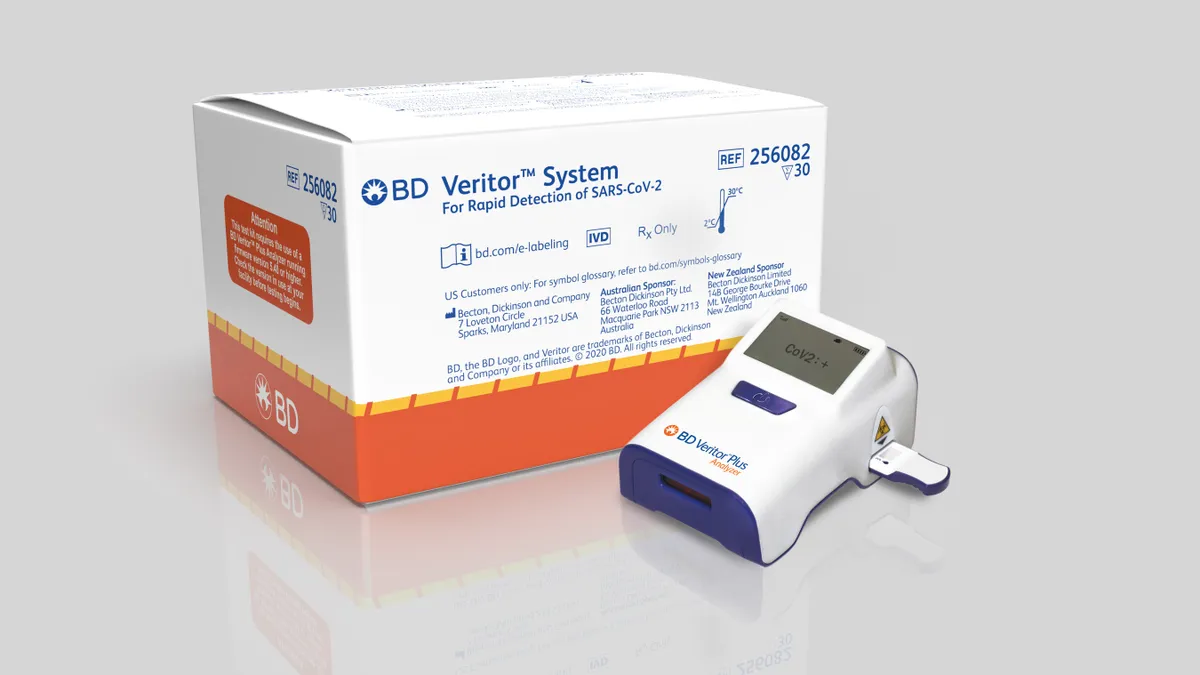Dive Brief:
- Becton Dickinson on Thursday reported third fiscal quarter revenues of $4.9 billion, growing 26.9% year over year on a reported basis driven by its base business, beating Street expectations of $4.5 billion.
- CEO Tom Polen told investors that BD benefited from "strong growth and momentum" across its medical, life sciences and interventional segments. COVID-19 diagnostics revenues totaled $300 million, ahead of the Street at $239 million, with BD's Veritor Plus rapid antigen test bringing in $212 million. However, SVB Leerink called results "mixed with a revenue beat but weaker-than-projected margins (lower COVID testing profitability)." Gross margins, which declined sequentially, were 51.5% below consensus expectations of 53.8%.
- BD boosted its full-year 2021 guidance, now expecting revenues to grow approximately 16.5% to 17% on a reported basis, up from guidance of 12% to 14%. But, SVB Leerink analysts noted that outlook "continues to assume no major system-wide hospital restrictions on elective procedures" related to the pandemic, despite the fact that the company in recent weeks "has started to see some impact to elective procedures from the delta variant in some states."
Dive Insight:
As medtech companies report financial results this earnings season close to 2019 levels, the surge in delta variant cases is making it difficult to predict the future impact of COVID-19.
Still, Polen told investors Thursday that BD continues to expect coronavirus testing revenues of $1.8 billion to $1.9 billion for the full-year fiscal 2021 "with more revenues coming from international markets than we previously anticipated."
BD has doubled down on its COVID-19 diagnostics guidance for the rest of the year, despite competitors Abbott and Quidel lowering their respective 2021 outlook due to a sharp and rapid decline in demand for coronavirus-related tests.
Nonetheless, CFO Chris Reidy said "there is a great deal of uncertainty around the level of COVID testing."
BD also announced Thursday that Reidy will retire and become a board director of the previously announced spinoff of its diabetes care unit. Reidy will serve in his current role until a successor is in place. The transaction for the separate publicly traded diabetes company is on track to be completed in the first half of calendar year 2022, according to Polen.
BD's base business revenues rose 17.6%, excluding coronavirus testing, which was better than expected and coincided with the "anniversary of the initial COVID wave and the temporary halting of elective procedures" in the year-ago quarter which impacted medical device utilization.
Based on positive third-quarter momentum, BD is raising its base business revenue assumption and now expects growth of 7.5% to 8%, higher than previous expectations of mid-single-digit growth.
At the same time, Reidy acknowledged gross margins are "negatively impacted" in fiscal 2021 by pandemic-related expenses and manufacturing variances, among other factors, which are "more acute in the second half of the year."
Reidy said that gross margins of 51.5% in the third fiscal quarter included a "net negative 90 basis point impact from COVID testing and reinvestments" and "negative 140 basis point impact from an inventory provision" also related to coronavirus tests.
Polen pointed out that the company's base business revenues grew 3.9% in the quarter relative to pre-pandemic third fiscal quarter 2019 levels on a currency neutral basis, including the impact of the shipping hold on its Alaris infusion pump.
"Exclude the U.S. infusion systems business, our total revenues would have increased 6.6%" compared to the third quarter of 2019, the CEO added.
Revenues for BD's medical segment rose 11.9% over the prior-year period on a reported basis, with growth in the medication delivery, pharmaceutical systems and diabetes care units partially offset by a decline in medication management.
Medication management revenues were negatively impacted by the Alaris shipping hold, which should improve "once we receive our 510(k) clearance," Polen said.
BD in late April filed a new 510(k) submission for its troubled Alaris system, which has been plagued by multiple software and hardware recalls. Reidy told investors Thursday the 510(k) submission brings Alaris up to date for all changes to the pump, including addressing open recall issues through a new version of software that will provide clinical, operational and cybersecurity updates.
Still, Reidy noted, "it is inherently difficult to predict clearance timing. We are not assuming Alaris 510(k) clearance ... We believe it is prudent and responsible not to definitively predict FDA clearance timelines."
Reidy said BD will provide fiscal year 2022 guidance on its November earnings call. However, the CFO added that the company has "increased confidence in our ability to deliver strong mid-single-digit revenue growth in fiscal '22 over our fiscal '21 base revenues."












